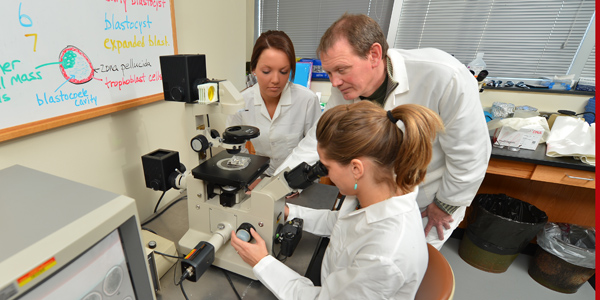
Tuning In To Student Needs Turns Out Student Success
Tuning In To Student Needs Turns Out Student Success
Curtis Youngs is an award-winning teacher. He’s received 11 teaching and academic advising awards in just the last two years, and students rank him first or second among animal science faculty teaching required courses at Iowa State. His accolades illuminate the skills, commitment and authenticity he offers his students.
“He knows his students by name— makes you feel like you’re connected to the class,” says Brady Zuck, a junior in animal science and pre-veterinary medicine. “The way he shares information is very easy to understand and follow. He also knows how to use humor.”
The professor of animal science employs a variety of classroom techniques, including “baaaad jokes” in sheep science class and “neighborhood chats” in his domestic animal reproduction course. As he lectures, he monitors student reactions. If he sees the “deer in the head- lights look” he asks a thought-provoking question on the topic and gives students permission to talk with other students about how to answer the question.
“Taking this little one-minute break, letting them become more active in their learning, enables them to come back and refocus for the rest of the lecture,” says Youngs.
“We need to develop students as people, develop their thinking skills and develop their self-confidence. I want to give them the encouragement and support they need to get outside their comfort zone and try new things,” says Youngs. “I tell students to be the best that they can be and to define success for themselves.”
Youngs says he was drawn to teaching by students’ inquisitive nature and interest in science—traits he shares. He was ushered into his career at Iowa State, in 1989, by his research. His areas of research include factors influencing embryo development and survival in domestic farm animals and applied reproductive technologies such as artificial insemination and embryo transfer.
A desire to “make a difference” led him to create novel courses at Iowa State, including a bioethics honors seminar and the only embryo transfer lecture and lab courses available to undergraduate students in the United States.
He also teaches career preparation in animal science, advises 65 undergraduate students and has served terms as faculty adviser for the Block & Bridle and Dairy Science Clubs. He is working with students to establish a new organization called the Alliance of Multicultural Pre-Veterinary Students.
His research, teaching and advising doesn’t end at the borders of Iowa State. Since 2007, through the USDA Borlaug Fellowship program, Youngs has helped young scientists in Peru, Kosovo and Ethiopia. He does this work using the developmental approach that has served him well with students at Iowa State.
“When working in an international agricultural setting you have to shed your views of your own world and ask, ‘What is important to these people?’ and help identify opportunities to cultivate new markets” Youngs says.



